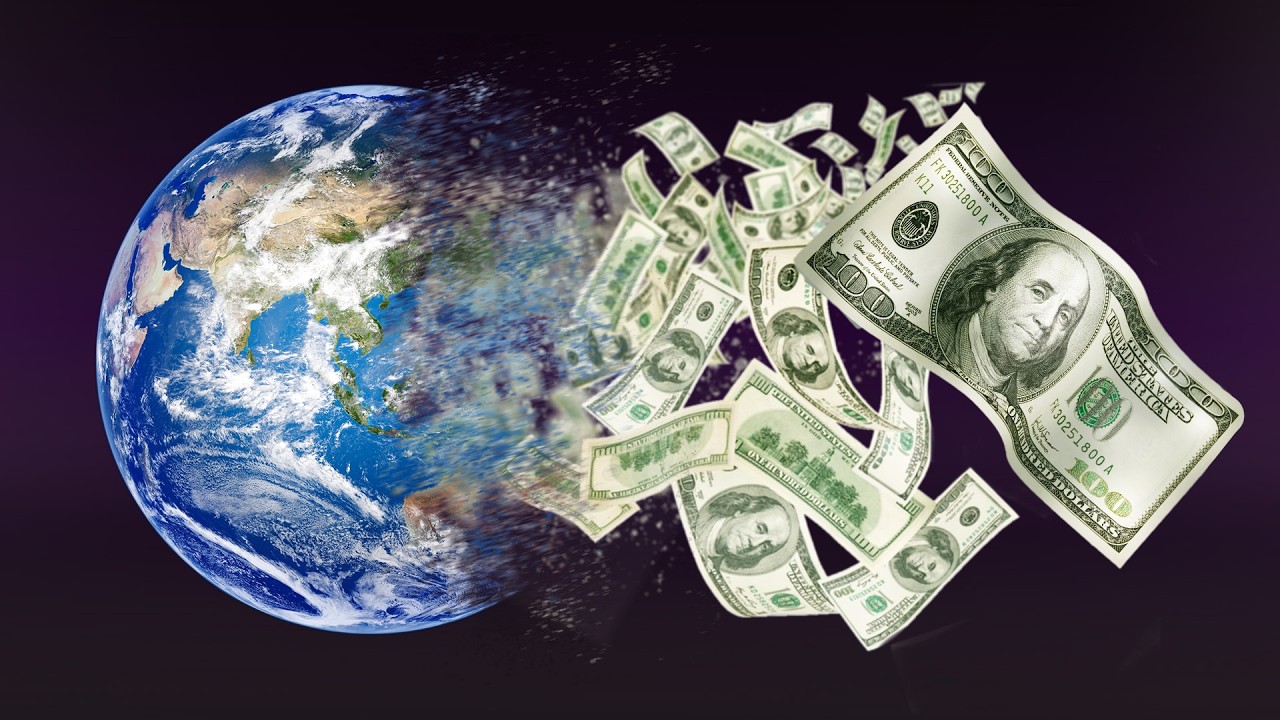
Is capitalism the problem? And if that’s the case, what should we do instead?
This is a guest video by Hazel Thayer as I have taken July off to work on my new studio. Please do give her a warm welcome and if you like this video introducing climate economics, please check out her channels!
Check Hazel out on…
YouTube: @hazelisonline
TikTok: https://www.tiktok.com/@hazelisonline
Instagram: https://www.instagram.com/hazelisonline
Her website: https://hazelthayer.com
REFERENCES
Externalities without math: https://www.iisd.org/savi/faq/what-is-an-externality/
We can measure GDP and include the environment as to include negative externalities in our calculations (green GDP) https://seea.un.org/news/rise-fall-and-rethinking-green-gdp
Capitalist-adjacent or reformist degrowth books
– Less is More by Jason Hickel
– Doughnut Economics by Kate Raworth
– Prosperity Without Growth by Tim Jackson
Anti-capitalist degrowth books/articles
– Slow Down by Kohei Saito
– Timothee Parrique’s work
Inequality is increasing rapidly https://news.un.org/en/story/2020/01/1055681
Inequality makes climate change worse https://www.oxfamamerica.org/explore/issues/climate-action/climate-change-and-inequality/
Increasing inequality increases emissions https://www.tandfonline.com/doi/abs/10.1080/09640568.2022.2050684
You can support the channel by becoming a patron at http://www.patreon.com/simonoxfphys
———- II ———-
More about me https://www.simonoxfphys.com/
My second channel – https://www.youtube.com/simonclarkerrata
Threads – https://www.threads.net/@simonoxfphys
Instagram – https://www.instagram.com/simonoxfphys
Twitch – https://www.twitch.tv/drsimonclark
———- II ———-
Music by Epidemic Sound: http://nebula.tv/epidemic
Some stock footage courtesy of Getty.
Edited by Luke Negus.
Is capitalism bad for the environment? And if it is, what are the alternatives anyway? In this video about climate change and capitalism, economist Hazel Thayer aka hazelisonline talks about what capitalism is, why it might not be working great, and what we can do to fix capitalism so that it doesn’t trash the planet.
Huge thanks to my supporters on Patreon:
Norm Zemke, I want to roll down a hill into a river of beans, David Mann, Ben Thayer, Eric A Gentzler, Glen Monks, Daniel Chen, Gary Stark, dryfrog, Marcus Bosshard, Peter Reid, bitreign33.
Jacob, Bastian Pranzas, Lucas Johnston, Jeffry ., Whitefang, Marius Kießling, Jon Arlov, Artem Plotnikov, Paul H and Linda L, Andy Hartley.
Duffman, Claudia Kapp, Cy ‘kkm’ K’Nelson, Baerbel Winkler, OldGreyWolf, Oscar Hoffmann, Steamrollerman , Andy Parr, Ricky Jones, Guy Markey, Nicholas Hamdorf, Katharina Hartmuth, Mark Phillips, Jor Eero Raico Svederic, KJ Xiao, Martin Sinclair, Matt Beer DFC, Tschäff Reisberg, Tobias Ahsbahs, James Gaskell, Denis Kovachev, Michael Thomas, Victor Gordan, Joona Mäkinen, Tanner , Dominik Rihak, Nico Casal, Laura Glismann, Mark Harper, Ryan, Inten, Tyler Schwartz, John, James Haigh, Rick Kenny, Bailey Cook, Sergio Diaz, Command Chat, Aisolon, Christopher Mullin, I’m stuck in a PhD and I blame Simon., Joseph , Nicklas Kulp, Thomas Newman, Anže Cesar, Josef Probst, Kevin B, Phineas, Ishaan Shah, AngryPanda, Circuitrinos, Mark Richardson, Brian Moss, Hampus Sandell, Thomas Miller, Knut Nesheim, Dajeni, AYS , Forever Bulking, Kim Parnset, Crisan Talpes, Pawel Piwek, Ted CLAY, Mike, Seb Stott, xawt, Diederik Jekel, Fuzzy Leapfrog, Jan-Willem Goedmakers, Samat Galimov, Ashley Hauck, Nico, Thibault , GGH, FireFerretDann, Ciotka Cierpienia, Sam, szigyi, Marcin Wrochna, Tom Painter, Phil Saici, Ashley Steel, Simone, Tomás Garnier Artiñano, Steffan , Adam Gillard, Christopher Hall, Miguel Cabrera Brufau, Sylvus , Florian Thie, James Gurney, Eddy Torres, Clemens, Andy Giesen, Jacob Speelman, Robin Anne McDuff, Jean-Marc Giffin, Cifer, Felix Winkler, Christian Weckner, Quinn Sinclair, Ebraheem Farag, Thomas Charbonnel, Sekhalis, Mark Moore, Philipp Legner, Zoey O’Neill, Justin Warren, Heijde, Trevor Berninger, streetlights, Gabriele Siino, David Mccann, Leonard Neamtu, James Leadbetter, Rapssack, Dan Sherman, Matthew Powell, Adrian Sand, Morten Engsvang, Haris Karimjee, Alex, The Cairene on Caffeine, Cody VanZandt, Casandra “Kalamity Kas” Toledo, Igor Francetic, Daniel Irwin, Sean Richards, Michael B., Thusto , Lachlan Woods, Dan Hanvey, Andrea De Mezzo, Real Engineering.
source







6:24 "which means companies need to make more stuff every year" is just not true. Companies can make more money from becoming more efficient. Take the effect of computers for example. Handling all the paperwork at a company used to be expensive, both in terms of man hours and the space and management required for storing the documents etc. Now you can handle it with fewer people and a bunch of laptops. The company makes more money from doing less and thus increases profits.
The answer is yes.
Low inequality doesn’t mean a higher standard of living. Countries that are extremely poor have low inequality because all the population earns about the same (which is almost nothing). What also can happen is that a rich country with low inequality still produces lot of CO2, like Norway, one of the most equal countries but that has oil extraction as one of it’s main economic activity and ranks 60 in CO2 emissions per country
To quote marlin manson Capitalism has made it this way good old fascism will take it away
How does mass immigration fit in?
You’re confusing “capitalism” with “greed”. The USSR and the CCP were waaay more damaging to the environment.
People want to be free to be better than other people. All of life, not just people, work that way. Go against life and you start killing people for your ideas of a utopia. Global warming alarmism is a religion, a doomsday cult.
I think it's kind of strange how you named the video capitalism. Even though you're really arguing against free market economies, there are other couples to economies like the Swedish model which you can directly mentioned with Sweden. And other economies like that, like the Netherlands.
If economic reasoning and decision making consider actual costs and values of an economic activity, for everyone, over all time, we will make sensible decisions. Lables don't help the discussion. Look at the whole picture and answers will be self apparent.
I really like the video. You don't find that many people talking about this in a reasonable way so thanks for treating this topic in the way you do it. I will check your channel, it looks very interesting.
Comments pass the vibe check
the wonder countries also don't have 100's of millions of people to provide for. its much easier to power small populations with green energy and a strong socialist safety net. human's lost control in the mid 70's. 8 billion people use the Earth's entire renewable resource budget for the year in just 6 months. we have been in overshoot for basically 50 years. gl everyone
Look in the mirror. There you will see the cause of climate change. Consumerism is the tool. Capitalism is the unfettered provider.
Yes. If you don't end capitalism, it'll end us.
🎉🎊 more like this! Hard to talk about but this is what it’s down to. Great video & appreciate the channel
Isn't capitalism making renewables cheaper?
Nice…
In the immortal words of Richard Wolff, "Socialism is when the government does stuff. And it's more socialism the more stuff it does. And if it does a real lot of stuff, it's communism."
Thanks for sharing
fun video, but I wish more stress had been laid on what exactly is meant by "capitalism" in this discussion. I've always figured that capitalism is innate to human civilization; sure we didn't have stock markets 2000 BC, but we did have a system where goods were exchanged for capital. So sure, degrowth and tackling inequality are all well and good, but I don't know if those concepts address the question of whether capitalism is the problem.
Additionally, I think those concepts leave out the issue of the global picture of current entrenched power structures and elites who benefit from the status quo. Sure, you might be able to talk about degrowth and such in some countries (emphasis on might), but good luck doing so in the dictatorships of the world.
Lastly, it would've been nice if the vid had gone into some more depth, and more papers/sources had been referenced, like Simon usually does in his videos. That said, all in all, still an interesting vid which got met thinking anyways, so thanks for making it 🙂
One issue with the (wealthier) "wonder countries" is that they still outsource polluting production to low-income countries, take part in Western imperialism (which also causes emissions) and the Netherlands in particular is really not doing that well in curbing emissions, biodiversity and the "nitrogen crisis".
Also, "a bit of capitalism and a bit of socialism" suggests socialism means government control of economy, which is not the case (which the presenter should know as one of the books she shows on screen is Post-Scarcity Anarchism bby Murray Bookchin.
Well, on the bright side, those who ask for the end of capitalism will be proven right in the end. Either with the system falling or the human race falling.
cool new blue hair simon!
Honestly Simon, I feel like this doesn’t accurately represent our views. I know we’re all left leaning around these parts of YouTube, but I don’t think this video portrayed socialist ideals in the best light. That’s not to say it shows us as backwards commies who want to control everything, but it doesn’t accurately portray our views, and I think it doesn’t put in enough effort to try.
I still love your channel, and I will very much support you into the future, but this video was very disappointing.
Thanks for reading if you actually did. ❤
I'd argue that we are not really in a capitalist syatem anymore, it's a Transnational Corporatist system.
The IMF estimates that the fossil fuel industry is subsidized to the equivalent of $7 trillion a year. Trillion, not billion. That is not capitalism, it is state capture, followed by holding the public to ransom. End that, and the fossil economy would crumble under its own weight.
You have to options: either you prioritize human flourishing or you prioritize environmental protection. Anyone who chooses to side with environmental protection should also know that staying alive means continued resource consumption, which puts a strain on the environment. So every environmental activist, while advocating for putting humanity beneath the environment, also puts their own life above the environment. And that, dear environmentalists, is a performative contradiction.
So I just discovered Simon’s channel I was impressed by the his neutrality and his ability to stick to the evidence and scientific consensus but this video apparently nothing to do with his usual content. There are a lot of claims made in this video that feel more ideological then factual, not the ideology of the person making the video necessarily, she seems to understand economics sufficient to be able to explain a market economy(although her understanding of it seems to be limited to a primitive understanding of Adam smith)and the concept of externality which she should have focus more on. But the big problems come in her framing of an ‘economy’. She only talk about the action of evil greedy corporations(which some times are evil) and never about where does their profit come from, which is equally greedy consumers, it’s not a specific feature of capitalism that people want to eat meat, drive big cars and heat themselves with gas, and hiding yourself under the idea that rich people are doing all the co2 intensive consumption is wrong, the average American drive their heavy car from their large suburbanite house to eat meat and those people are way more numerous and important then the few billionaires, and asking them to collectively vote with their money for more climate action is not more crazy then asking them to vote in elections for the same cause.
The second point is that she seems to be under the assumption that growth in developed countries comes from natural resources extraction you can ask any economists it’s factually wrong It’s actually mostly a poor country thing not letting them extract any of their resources is robbing them from not been in poverty, so I agree that rich countries should pays way more for green transition. BUT DEGROWTH HAS NOTHING TO DO WITH THAT. Any consideration of degrowth should make someone’s opinion invalid because not growing an economy means destroying the tools we have to fight climate change, we are not going to have any weight internationally to advocate for any of climate goals, we won’t be able to innovate and make things like renewable cheaper if we are knee caping our economies.
And the third point is that I agree that the Nordic model is the way to fight climate change but if anything, they are some of the most capitalist countries in the world by her definition, the world ease of doing business index rank most of them higher then America and they have very correct GDP growth and capital formation, these countries are not ‘socialist‘(which she didn’t define so who knows what it means) they just have a smarter government, the same way a capitalist country but with a terrible government would have dumb policies like tariffs it can also have dumb policies like subsidizing oil, none of these are good for capital.
Bruh the list or rich countries is way longer than that and the USA is even lower almost all EU member countries are higher than the USA SMH.
yes. yes, it is
Capitalism is great. Allowing for the creation of individual wealth is nothing to do with a problem created by government intervention.
People here don't really think about the geopolitical implication of things like degrowth movement. People here also seems to talk on a very US centric lense.
I saw the part where she talk how producing more stuff just lead to more pollution then I ask if China build more EV or battery using resource mined from Africa, is that bad? They put out more pollution but their economy grow and living standard increases.
People talk about recession being a bad thing because there usually is more and more people in a country (this video seems to be specific for the US). If there are more people in the country but the economy doesn't grow, it usually mena sthe average living standard drop (there should be more nuance to this due to inequality but in general the economist think like this)
As a socialist here socialism is the answer their reasons why it hasnt worked and its capitalists that have pre'vented it like the first 911
Capitalism isn’t the issue, it’s the incentives. Something really exciting is that green companies receive more investment than brown companies, that means rich people who invest the most money are choosing green companies, helping them expand, and invest in even cleaner technologies! There is one big entity that still invests large amounts into brown companies though and that’s the government